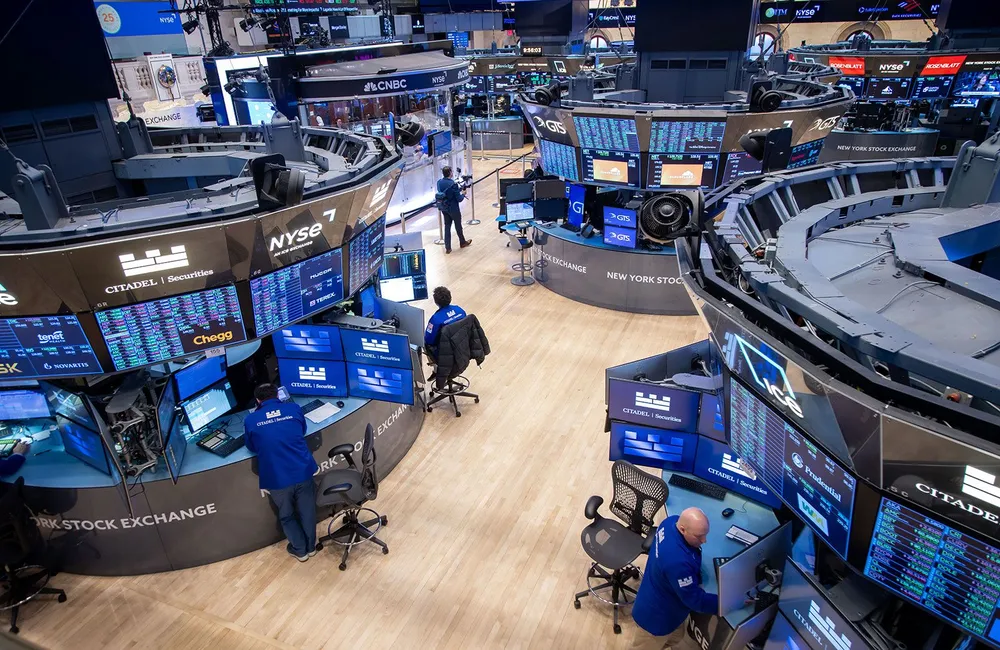ASX futures fell 5 points or 0.1% to 6911 at 8.00 am on Friday, down from slight gains earlier in the day.
The S&P 500 fell 0.1 percent, a swing that turned losses into gains as the benchmark once sat 30 points away from a bear market, a 20 percent drop from the most recent high. The Dow Jones Industrial Average declined 0.3%. The Nasdaq Composite Index rose less than 0.1%. All three indexes are on track for weekly losses of at least 3.5%.
Stocks have dropped, pressured by concerns about the US Federal Reserve dialing back its easy monetary policies as it fights off recently stubborn high inflation. Consumer prices increased in April at a slower pace than in the month before, but still at a faster rate than economists had been forecasting, data released Wednesday showed.
That stoked further fears that the central bank will hike interest rates at a sizable clip and kill economic growth, a burdensome prospect for markets that had been trained to expect easy monetary policy.
“They [tech investors] were at the most vulnerable point, at the furthest on the cliff, so they are now walking back from the cliff and trying to get to more solid ground, and they’re changing their risk profiles,” said Dan Genter, chief executive and chief investment officer of Genter Capital Management.
In the local market, the S&P/ASX 200 was down 1.75% at 6941.0 in early afternoon trades, having been dragged lower to the lowest close since March 8 by a rout in tech. The benchmark index was down 0.5pc after an hour but losses accumulated as all 11 sectors of the market lost ground.
The tech sector fell 8.7% for its worst day since the Covid-19 pandemic upended global markets in March 2020. Block's local securities fell 18 per cent, while Altium, Life360 and Xero lost 17 per cent, 12 per cent and 12 per cent, respectively.
Just 13 ASX 200 components rose, while commodity and consumer stocks were also soft.
Three exchange-traded funds, or ETFs, that invest in bitcoin or ethereum began trading on Australia’s Cboe on Thursday, a bloodbath of a day for cryptocurrencies.
“Did not believe a tougher day could have greeted the new Aussie crypto ETFs,” tweeted City Index market analyst Tony Sycamore.
Commonwealth Bank rose 0.6%, as it released its 3Q results.
The ASX 200 is down 3.7% for the week and headed for its largest weekly fall since October 2020.
In commodity markets, Brent crude oil added 0.3% to US$107.88 a barrel. Iron ore dropped 4.5% to US$127.55. Gold was down 1.6% to US$1824.60
Bonds continued to rally, with the yield on the Australian 2 Year government bond falling to 2.59%, and the 10 Year dropping to 3.42%. Abroad, US Treasury 2 Years yields moved lower to 2.56%, while 10 Year dropped to 2.85%.
The Australian dollar was at 69.53 US cents at 7.00 am on Friday, compared with a previous close of 69.36. The Wall Street Journal Dollar Index, which measures the US dollar against 16 other currencies climbed to 96.96.
Asia
Chinese stocks finished mixed at the end of the session, following broad losses among Asian equities as investors digested US inflation data that came in higher than expected. The Shanghai Composite Index dipped 0.1% to 3054.99, the Shenzhen Composite Index was up 0.2% to 1921.65 and the ChiNext Price Index gained 0.2% to 2351.27. Developments around China’s Covid-19 policies will also be in focus, after the country’s censors scrubbed the W.H.O.’s criticism of its zero-Covid strategy from social media on Wednesday.
“Infectious disease restrictions like China’s Covid-zero policy doing a number on growth.”...Nor have China's property developer debt troubles disappeared amid reports major developer Sunac has skipped paying on a foreign currency bond,” Oanda senior market analyst Jeffrey Halley wrote in a note.
Hong Kong’s Hang Seng Index closed 2.2% lower at 19380.34, with investors still digesting the latest US inflation data.
The stronger-than-forecast inflation print has stoked fears that central banks could act to bring demand down more forcefully, IG’s market strategist Yeap Jun Rong writes in a note.
The Chinese property market is also in the spotlight after one of the country’s largest developers, the Hong Kong-listed Sunac China, told investors it hadn’t met debt obligations on multiple senior notes. Sunac China is on a trading halt. Longfor Group fell 3.5% and China Overseas Land & Investment slipped 4.8% among other property stocks.
Japan’s Nikkei Stock Average declined 1.8% to finish at 25748.72 on concerns about Fed tightening. The declines on the Nikkei were led by a mixed bag of companies. M3 Inc. fell 10%, NTT Data was down 9.85% and Lasertec shed 9.1%. Olympus Corp., on the other hand, advanced 11% after forecasting a 33% increase in net profit for the fiscal year.
Europe
European markets were close to paring some losses after a mixed opening to trading on Wall Street. After slumping almost 2 percent earlier, the Stoxx Europe 600 fell 0.7 percent, the French CAC 40 retreated 1 percent and the German DAX lost 0.6%.
“Investors will have been hoping for a bounce and given that a whole host of markets have given oversold readings, traders will have been expecting one,” IG analyst Chris Beauchamp says. “But considering the wreckage done in recent weeks and persistent, withering fears of a recession, that all suggests it’s ludicrous to think things could revert to the orderly advances that ruled in 2021.”
London’s FTSE 100 ended down 1.6% after data showed the UK was also facing a risk of a sharp economic slowdown, publishing weak GDP figures for the first quarter, and as investors worried that the U.S. Federal Reserve would derail growth in a bid to rein in inflation.
“How the UK fares, whether it slips into a technical recession or something more severe, will be determined largely by how consumers choose to behave and how external risks play out,” Kallum Pickering, a senior economist at Berenberg, said in a note.
JD Sports Fashion was the day's biggest riser, up 6.6%, followed by Coca-Cola HBC AG, up 5.6%, and fashion retailer Next, which was up 3.4%. Fresnillo was the biggest faller of the session, down 8.9%, followed by Endeavour Mining, off 7%, and BP, down 4.7%.
North America
The Dow Jones Industrial Average fell for a sixth day in a row on Thursday, part of an extended spell of volatility in a market driven by concerns that the Federal Reserve will choke off growth as it tries to wrestle inflation under control.
The blue-chip index was 0.3% lower. The S&P 500 declined 0.1%. The Nasdaq Composite Index rose less than 0.1%. All three indexes are on track for weekly losses of at least 3.5%.
Stocks have faced pressure amid worry over the Fed’s unwinding of easy monetary policies as it confronts a renewed bout of high inflation. Consumer prices increased in April at a slower rate than the previous month, but still more quickly than economists were expecting, according to data released Wednesday.
That added to concerns that the central bank will hike interest rates at an aggressive pace and crush economic growth, a burden on markets that had grown used to loose monetary policy. Tech stocks especially thrived in the ultra-low interest-rate era and have slid drastically this year, with the Nasdaq Composite trading at its lowest level since November 2020.
“They found themselves at the most vulnerable time, they were furthest out on the cliff, and they are now walking back from the cliff and trying to get on more solid ground and they’re changing their risk profiles,” said Dan Genter, chief executive and chief investment officer of Genter Capital Management.
Mr. Genter encourages investors to seize on the recent drops, which have made stocks cheaper. His firm isn’t concerned about a recession but is still sitting on the sidelines with dividend-paying stocks in caution mode.
The yield on the benchmark 10-year Treasury note fell to 2.815%, slipping for a fourth straight trading session. Bond yields and bond prices go in opposite directions.
The recent drop in Treasury yields suggests the bond-stock relationship could be getting better. Earlier this year, stocks and bonds plunged in kind at a rate not seen in decades.
“There is a likelihood that the correlation between bonds and equities at this point can become negative again and that is one of the ingredients to stabilize the markets,” said Olivier Sarfati, head of equities at GenTrust.
“On the margin, markets have repriced the probability of a hard landing, and the extent of further tightening by the Fed,” said Karim Chedid, an investment strategist at BlackRock. The drop in longer-dated bond yields seems to reflect reduced expectations for growth, he said.
The dollar gained, with the ICE US Dollar Index climbing 0.9% to its highest level since 2002. The index gauges the greenback against a basket of rival currencies.
Cryptocurrencies also remained choppy, with bitcoin on Thursday dropping as low as $25,402.04, its lowest since December 2020, before rebounding to around $28,300, according to CoinDesk. Since peaking last November, it has shed about 60 percent of its value. Ether fell 4.8% from Wednesday, to trade around $1,933.85.
Coinbase gained $4.78, or 8.9 percent, to $58.50, after giving up more than a quarter of its value on Wednesday.
“Because inflation has remained high, the Fed has continued to act more restrictive with monetary policy, so it conceptually makes sense that you see multiple contractions, and of course the names with the biggest multiples are going to feel the biggest pressure,” said Bill McMahon, chief investment officer for Active Equity Strategies at Schwab Asset Management. Mr. McMahon suggests that investors swim to safety in defensive parts of the market.
In corporate news, Beyond Meat slipped $1.09, or 4.2 percent, to $25.08 after the meat-alternative company posted a wider than expected loss for the latest quarter as it increased spending.
WeWork shares climbed 53 cents, or 10%, to $5.63 after posting a smaller loss and lifting its outlook. Walt Disney fell 9 cents, or 0.9 percent, to $104.31 after the company posted wider operating losses and said it may not sustain its current growth rate of streaming subscribers.
Meme stocks climbed. GameStop climbed $8.24, or 10 percent, to $89.57. AMC Entertainment gained 83 cents, or 8 percent, to $11.20. Bed Bath & Beyond added 18 cents, or 2 percent, to $9.40.
On the other hand, the state-owned oil company, Saudi Aramco, edged out Apple for the title of largest company in the world by market value, according to Dow Jones Market Data. Apple shares declined $3.94, or 2.7 percent, to $142.56.
Oil prices slid after US crude stockpiles increased more than anticipated, but then rebounded somewhat. Brent crude, the global benchmark, lost 6 cents a barrel, or less than 0.1 percent, to $107.45. Analysts at ANZ said prices were also weighed down by the slow progress in European Union negotiations to potentially ban imports of Russian crude.





















